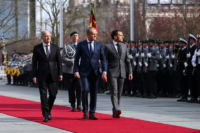
El problema ruso de la socialdemocracia alemana
Las disputas más trascendentales en la política suelen ser las que tienen lugar dentro de los partidos políticos, no entre ellos. En Alemania, estas rupturas internas son muy poco frecuentes. La última tuvo lugar en 1959, cuando el Partido Socialdemócrata de Alemania (SPD, por sus siglas en alemán) rompió con el marxismo y se convirtió en uno de los partidos de centroizquierda más populares de Europa. El SPD podría estar a punto de sufrir otro cambio de este tipo, pero esta vez las fuerzas de resistencia son más formidables.
Un grupo de eminentes historiadores alemanes, todos ellos miembros del SPD, ha escrito una carta abierta para criticar la negativa del partido a distanciarse de Vladímir Putin y por no apoyar a Ucrania.… Seguir leyendo »












